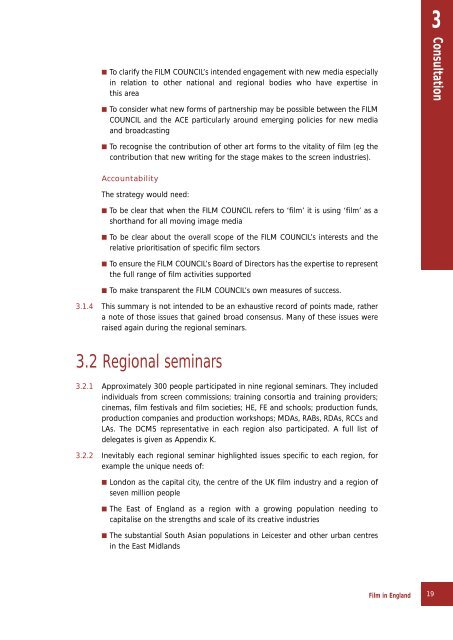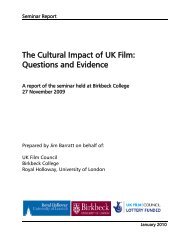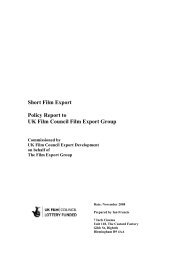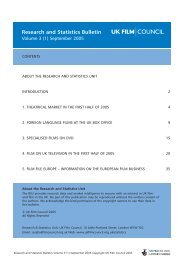FILM IN ENGLAND - UK Film Council - British Film Institute
FILM IN ENGLAND - UK Film Council - British Film Institute
FILM IN ENGLAND - UK Film Council - British Film Institute
Create successful ePaper yourself
Turn your PDF publications into a flip-book with our unique Google optimized e-Paper software.
■ To clarify the <strong>FILM</strong> COUNCIL’s intended engagement with new media especially<br />
in relation to other national and regional bodies who have expertise in<br />
this area<br />
■ To consider what new forms of partnership may be possible between the <strong>FILM</strong><br />
COUNCIL and the ACE particularly around emerging policies for new media<br />
and broadcasting<br />
■ To recognise the contribution of other art forms to the vitality of film (eg the<br />
contribution that new writing for the stage makes to the screen industries).<br />
Accountability<br />
The strategy would need:<br />
■ To be clear that when the <strong>FILM</strong> COUNCIL refers to ‘film’ it is using ‘film’ as a<br />
shorthand for all moving image media<br />
■ To be clear about the overall scope of the <strong>FILM</strong> COUNCIL’s interests and the<br />
relative prioritisation of specific film sectors<br />
■ To ensure the <strong>FILM</strong> COUNCIL’s Board of Directors has the expertise to represent<br />
the full range of film activities supported<br />
■ To make transparent the <strong>FILM</strong> COUNCIL’s own measures of success.<br />
3.1.4 This summary is not intended to be an exhaustive record of points made, rather<br />
a note of those issues that gained broad consensus. Many of these issues were<br />
raised again during the regional seminars.<br />
3.2 Regional seminars<br />
3.2.1 Approximately 300 people participated in nine regional seminars. They included<br />
individuals from screen commissions; training consortia and training providers;<br />
cinemas, film festivals and film societies; HE, FE and schools; production funds,<br />
production companies and production workshops; MDAs, RABs, RDAs, RCCs and<br />
LAs. The DCMS representative in each region also participated. A full list of<br />
delegates is given as Appendix K.<br />
3.2.2 Inevitably each regional seminar highlighted issues specific to each region, for<br />
example the unique needs of:<br />
■ London as the capital city, the centre of the <strong>UK</strong> film industry and a region of<br />
seven million people<br />
■ The East of England as a region with a growing population needing to<br />
capitalise on the strengths and scale of its creative industries<br />
■ The substantial South Asian populations in Leicester and other urban centres<br />
in the East Midlands<br />
<strong>Film</strong> in England<br />
19<br />
3<br />
Consultation

















